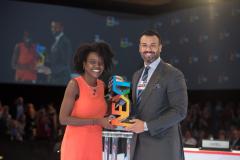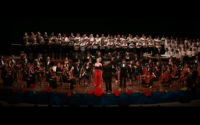Ubongo Wins ‘Next Billion’ Edtech Prize
Ubongo, which creates fun, localised and multi-platform educational media that reaches millions of families through accessible technologies, has won the ‘Next Billion’ Edtech Prize launched by The Varkey Foundation to recognise the most innovative technology destined to have a radical impact on education in low income and emerging world countries.
Ubongo was voted for by delegates at The Global Education & Skills Forum from three startup finalists which include PraxiLabs, and Dost. All three winners will be awarded $25,000.
30 startups were selected to pitch for the ‘Next Billion’ Edtech Prize, which focuses on low income and emerging economies. The winners were chosen from six finalists which included FinEazy, Signa, and Sabaq.
Led by TechCrunch Editor-at-Large Mike Butcher, the expert panel of judges was made up of venture capitalists, philanthropic investors, experts in Edtech and learning sciences, and senior education policy makers.
Mike Butcher said:
“It was clear to the judges that emerging market Edtech is going to be one of the hottest tech sectors in the world over the next few years. The majority of the startups we saw during the competition clearly have enormous potential, it’s clear the new wave of Edtech is about to hit its stride. It’s fantastic that GESF is throwing the spotlight on this exciting sector.”
The jury selected the three winners from six finalists who pitched on the main GESF stage on Sunday morning. The audience voted on who should lift the trophy.
Ubongo leverages the power of entertainment, the reach of mass media, and the connectivity of mobile devices, to deliver effective, localized learning to African families at low cost and massive scale. Its family-friendly content promotes literacy and education in resource-poor areas. Through learning at home and in the family through a variety of channels, from online to radio and TV – multi-channel players, cartoons are a central part of its story telling approach.
Location: Tanzania
Ubongo Chief Executive Nisha Ligon said:
“We’re delighted to have won the Next Billion Prize. We’re already having an impact reaching children but this award will mean we can do so much more. By 2022 we plan to reach 30 million children in Africa and our ultimate goal is to reach 440 million – every child in Africa.”
Dost empowers parents of any literacy level to take charge of their child’s early education, creating short, friendly audio content that is sent to parents via their mobile phones. Dost software, audio content, and toolkits make it easy, fun and addictive for parents to boost their child’s early development, so low-income families need no longer send their children to primary school behind and without a chance to catch up.
Location: India
Dost CEO Sneha Sheth said:
“It’s really exciting to bring Dost to the global stage at GESF, it motivates us even more to keep working on our mission to help parents to unlock their child’s full potential.”
PraxiLabs provides virtual laboratories for schools and learning organizations in the Middle East and beyond. With 3D simulations of major experiments in biology, chemistry and physics, students can access these from their devices at any time. Additional multimedia files help students perform their scientific experiments and the whole process can be integrated within existing learning management systems of schools or education providers, giving learners worldwide tools to experiment and learn science.
Location: Egypt
PraxiLabs Founder Khadija Elbedweihy said:
“We are thrilled to be one of the top three winners for this prize, this is a priceless opportunity for us to help build awareness of our mission of providing the world with more scientists.”
This prize identifies, spotlights and celebrates the world’s leading EdTech startups that have shown through ingenuity and innovation that they can improve learning in parts of the world where there is limited access to good quality teaching.
According to UNESCO, 264 million children do not have access to schooling, while at least 600 million more are “in school but not learning”. These are children who are not achieving even basic skills in maths and reading, which the World Bank calls a “learning crisis”.
Sunny Varkey, Founder of the Varkey Foundation and the Next Billion Prize said,
“Over a billion young people – a number growing every day – are being denied what should be the birthright of every single child in the 21st century, no matter where they live: a good education that allows them to make the most of their God-given talents.
“We use the ‘Next Billion Prize’ to highlight technology’s potential to tackle the problems that have proven too difficult for successive generations of politicians to solve. Our fervent hope is that the prize inspires practical and persistent entrepreneurs the world over to come forward with fresh tech ideas. These ideas must be hardy enough to improve education in regions where young people are denied access to a good quality teacher and a great learning environment”.
The ‘Next Billion’ Edtech Prize, which comes five years after the Varkey Foundation founded the US $1 million Global Teacher Prize, was awarded for the first time at the Global Education and Skills Forum (GESF) 2018. The GESF brings together over 2000 delegates from around the world to solve the big questions in global education.
Sunny Varkey added:
“The EdTech prize joins some of most important players from the spheres of education and technology together. Startups will have access to every type of stakeholder – from Silicon Valley venture capitalists to former and current education ministers, foundations, academics and the world’s best teachers. They can draw on their expertise and support to build products that will work as well in the classroom as they do in a pitch”.
Photographs of the finalists can be accessed here:
https://www.flickr.com/photos/gesf







